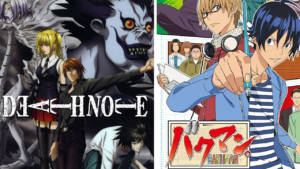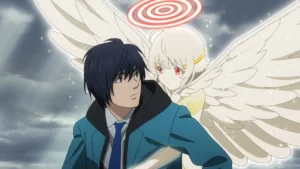ANIME REVIEW: Platinum End (Spoiler)
In one of our recent podcasts here at Paper Straw Media, Chris Short mentioned that he’s been watching a series on Netflix titled ‘Platinum End.’ This was quite interesting to me at the time because Chris doesn’t watch anime, and his first impression was that he seemed to like and enjoy the series. Going so far as to recommend it. So, is his recommendation any good?
Given that the series has been around for a while, this review will encompass both the anime and manga. Fair warning: there might be a few spoilers ahead.
When it comes to Platinum End, it’s a bit like expecting a gourmet meal and getting a microwave dinner instead. This highly anticipated anime from Tsugumi Ohba, the genius behind Death Note, had us all hoping for greatness. So, did Platinum End live up to the hype? Well, not exactly.

Let’s face it, Platinum End isn’t terrible, but based on its pedigree, one would understand why it’s being deemed mediocre. Currently sitting at 6.5 on MyAnimeList, it doesn’t scream to people that it has the plague and should be avoided at all costs, but I can’t really even say that it’s a good thing. The real issue here is the burden of high expectations, mainly because of Ohba’s previous works like Death Note and Bakuman.

Sometimes, an anime’s downfall is the weight of expectations piled upon it. Platinum End suffered precisely that fate—it couldn’t quite reach the towering pedestal fans had set up for it. The shadow of Death Note looms large, and it’s hard not to compare the two.
Context matters when we evaluate Platinum End. If you divorce it from its creator’s legacy, it might have fared better in the eyes of viewers and critics. But alas, it couldn’t escape the long shadows cast by Ohba’s previous triumphs.
Platinum End found itself a victim of its own success. With Death Note and Bakuman in Ohba’s repertoire, we expected nothing short of brilliance. It’s a bit like expecting LeBron James to score a slam dunk with every shot; anything less feels like a letdown. And Platinum End felt that pressure.
The anime’s promotional materials did it no favors either, building an even higher pedestal for it. Sadly, it entered an entirely different arena than its predecessors, diving into the world of a battle royale. This departure made it challenging to don the nostalgia goggles we’d wear for Death Note or Bakuman.
Now, let’s talk characters. Mirai Kakehashi, our protagonist, is a rather dull fellow. Sure, he’s supposed to be tragic, but his portrayal lacks the charisma that would make us empathize with his despair. In contrast, characters like Eren from ‘Attack on Titan’ manage to captivate us despite their tragic backgrounds. Mirai just lacks that “IT” factor. Also, I don’t even know if it’s just a coincidence that Ohba named his MC Mirai while ‘Mirai Nikki’ (which has a similar plot) exists.

Saki Hanakago, another key character, feels like a waste of screen time. She’s there, but she doesn’t do much. Ohba’s tendency to sideline female characters in his works has always bugged me. If a character isn’t going to contribute significantly to the story, why include them at all?
And then there’s the emotional rollercoaster some characters ride. They swing from stoic to overly emotional, with no middle ground. Gray areas are scarce, and this disrupts the story’s flow. A few characters with this dynamic are fine, but when everyone’s doing it, it becomes a problem.
The plot itself suffers from a lack of clarity. Mirai’s motives are elusive, leaving us in the dark about what he truly wants. This uncertainty lingers throughout the series, making it difficult to connect with the character. And then there’s the so-called villain, Kanade Uryu, or Metropoliman, whose motives are equally baffling. His actions seem silly and pathetic at times, making it hard to take his scheming seriously.
The plot also relies heavily on pushing Mirai into action, often feeling forced. Forced plot progression doesn’t sit well with viewers who want a natural narrative flow. Mirai’s constant need for a push to take action feels more like a hindrance than a compelling story element.
To be fair, Platinum End does improve as it progresses, especially in the middle of the series. However, not everyone has the patience to endure a rocky start. Again, Ryan Epps’ three-episode rule might not work for this one. The anime’s initial impression may be enough to turn some viewers away, even though it becomes somewhat watchable later on.
In conclusion, Platinum End isn’t a bad anime, but it falls short of what it could have been. Its flaws don’t stem from the studio’s handling of the anime itself, but rather from the enormous expectations it carried. Sometimes, the burden of high hopes can weigh an anime down, and Platinum End bears that burden all too well. I think this also explains why Chris Short’s reaction and enjoyment of the anime highly differ from those that are familiar with Ohba’s past works.